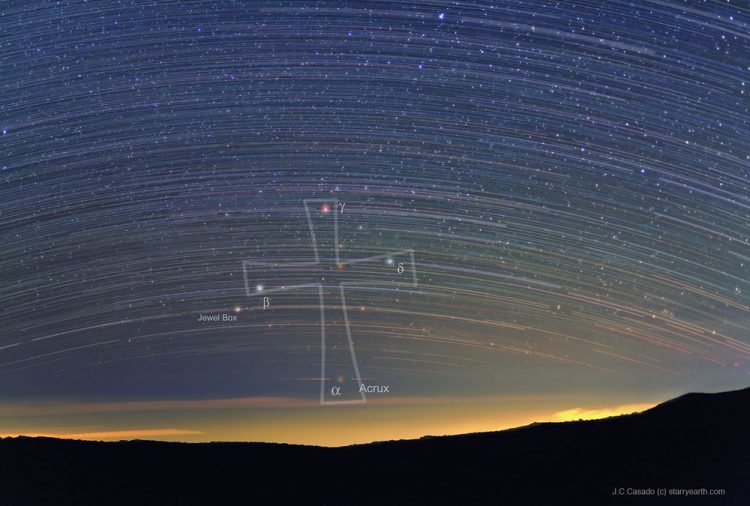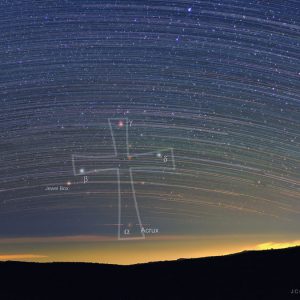Cross Above Tenerife
Description
Have you ever seen the Southern Cross from 28 degrees north? This is perhaps a record to capture the complete view of this small but notable southern constellation from the northern hemisphere. This long-exposure image shows stars trailing over the southern horizon of Tenerife, Canary Islands. The image is made of a sequence of many short-exposure images (See this sequence in a time-lapse video . A gap in the middle of sequence allowed the photographer to add a single short-exposure image which shows the brighter stars including those of constellation Crux, generally known as the Southern Cross. Move the slider on the image to see the figure and labels. As added by the photographer “The image is the result of nearly two hours of continuous shots. To my knowledge this is the first ever image of full Southern Cross, including the lower star Acrux from this northern latitude. I made the image from Teide National Park at altitude of 2300 meters, probably the place with darkest and most transparent sky on the island. The atmospheric physics contained in this picture is interesting too. Theoretically the star Acrux (alpha Crux at declination -63º 10′) never appears over the horizon of this place. However, due to atmospheric refraction and the high altitude, the star is visible only for a few minutes in mid-May in early evening. The color of the star appears deep red while it’s really a blue star, because its seen through the horizon and its light travels a longer distance in the Earth atmosphere to reach the viewer, causing its shorter wavelength to absorbed in our atmosphere (similar to orange-red view of the sun at sunset or sunrise). While I imaged Crux at the very limit of its northern visibility it is interesting that the constellation was visible about 2000 years ago in Mediterranean regions due to the precession of the equinoxes. This seems to be the scientific origin for festivities of May Cross (“Cruz de Mayo” in Spanish), celebrated all over Spain. Crux is the smallest constellation in the sky and one of the most famous, because it’s used to locate the south celestial pole. Beginning in the colonial age, Crux was selected as a national symbol by several southern nations. The brightest stars of Crux appear on the flags of Australia, Brazil, New Zealand, Papua New Guinea and Samoa.”




comments (1)
Magnificence and extraordinary!!
March 8, 2012 at 6:53 am